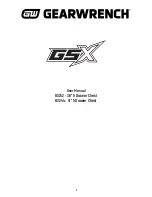
Seagate SkyHawk AI Product Manual, Rev. F
21
Seagate drives are tested for compliance and complies with the European Union (EU) Electromagnetic Compatibility (EMC) Directive
2014/30/EU and the Low Voltage Directive (LVD) 2014/35/EU. Accordingly, the drives also meets the requirements of Morocco's
Order of the Minister of Industry, Trade, Investment and Digital Economy No. 2574-14 of 29 Ramadan 1436 (16 July 2015) on
electromagnetic compatibility of equipment.
2.11.7 Taiwanese BSMI
Drives with the Taiwanese certification mark comply with Chinese National Standard, CNS13438.
For compliance with the Taiwan Bureau of Standards, Metrology and Inspection’s (BSMI) requirements,
See Section 2.12.4 on page 22.
2.11.8 FCC verification
These drives are intended to be contained solely within a personal computer or similar enclosure (not attached as an external
device). As such, each drive is considered to be a subassembly even when it is individually marketed to the customer. As a
subassembly, no Federal Communications Commission verification or certification of the device is required.
Seagate has tested this device in enclosures as described above to ensure that the total assembly (enclosure, disk drive,
motherboard, power supply, etc.) does comply with the limits for a Class B computing device, pursuant to Subpart J, Part 15 of the
FCC rules. Operation with noncertified assemblies is likely to result in interference to radio and television reception.
Radio and television interference.
This equipment generates and uses radio frequency energy and if not installed and used in
strict accordance with the manufacturer’s instructions, may cause interference to radio and television reception.
This equipment is designed to provide reasonable protection against such interference in a residential installation. However, there is
no guarantee that interference will not occur in a particular installation. If this equipment does cause interference to radio or
television, which can be determined by turning the equipment on and off, users are encouraged to try one or more of the following
corrective measures:
• Reorient the receiving antenna.
• Move the device to one side or the other of the radio or TV.
• Move the device farther away from the radio or TV.
• Plug the computer into a different outlet so that the receiver and computer are on different branch outlets.
If necessary, users should consult a dealer or an experienced radio/television technician for additional suggestions. Users may find
helpful the following booklet prepared by the Federal Communications Commission:
How to Identify and Resolve Radio-Television
Interference Problems
. This booklet is available from the Superintendent of Documents, U.S. Government Printing Office, Washington,
DC 20402. Refer to publication number 004-000-00345-4.
2.12
Environmental protection
Seagate designs its products to meet environmental protection requirements worldwide, including regulations restricting certain
chemical substances.
2.12.1 European Union Restriction of Hazardous Substance Law
2.12.2 Restriction of Hazardous Substances in Electrical and Electronic Equipment
Seagate drives are designed to be compliant with the European Union RoHS "Recast" Directive 2011/65/EU (RoHS 2) as amended by
Directive (EU) 2015/863. The RoHS2 restricts the use of certain hazardous substances such as Lead, Cadmium, Mercury, Hexavalent
Chromium, Polybrominated Biphenyls (PBB) and Polybrominated Diphenyl Ether (PBDE), BisBis(2-Ethylhexyl) phthalate (DEHP),
Benzyl butyl phthalate (BBP), Dibutyl phthalate (DBP), and Diisobutyl phthalate (DIBP) in electrical and electronic equipment (EEE).
2.12.2.1 Substances of Very High Concern (SVHC)
The European Union REACH (Registration, Evaluation, Authorization and Restriction of Chemicals) Regulation (EC) 1907/2006
regulates chemicals shipped into and used in Europe. A number of parts and materials in Seagate products are procured from
external suppliers. We rely on the representations of our suppliers regarding the presence of REACH substances in these articles and
materials. Our supplier contracts require compliance with our chemical substance restrictions, and our suppliers document their
compliance with our requirements by providing full-disclosure material content declarations that disclose inclusion of any REACH-
regulated substance in such articles or materials. Product-specific REACH declarations are available upon request through your
Seagate Sales Representative.














































